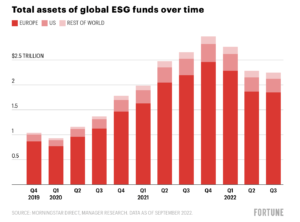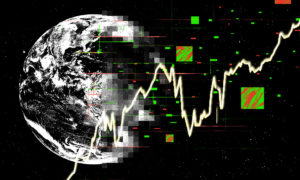Harvard Business Review, May – June 2021
 For two decades progressive thinkers have argued that a more sustainable form of capitalism would arise if companies regularly measured and reported on their environmental, social, and governance (ESG) performance. But although such reporting has become widespread, and some firms are deriving benefits from it, environmental damage and social inequality are still growing.
For two decades progressive thinkers have argued that a more sustainable form of capitalism would arise if companies regularly measured and reported on their environmental, social, and governance (ESG) performance. But although such reporting has become widespread, and some firms are deriving benefits from it, environmental damage and social inequality are still growing.
This article, by Timberland’s former COO, outlines the problems with both sustainability reporting and sustainable investing. The author discusses nonstandard metrics, insufficient auditing, unreliable ESG ratings, and more. But real progress, he says, requires not just better measurement and reporting practices but also changes in regulations, investment incentives, and mindsets.
Read the full article: https://hbr.org/2021/05/overselling-sustainability-reporting

 There is a strong appetite in the investment community right now for sustainable funds to invest in but does that investment lead to sustainable outcomes, and also important – is it a sound investment?
There is a strong appetite in the investment community right now for sustainable funds to invest in but does that investment lead to sustainable outcomes, and also important – is it a sound investment? Most people assume that ESG Investing is designed to reward companies that are helping the planet. In fact, ESG ratings which underlie ESG fund selection are based on “single materiality” — the impact of the changing world on a company P&L, not the reverse. Asset management firms have been happy to let the confusion go uncorrected — ESG funds are highly popular and come with higher management fees. The danger with ESG investing is that it might convince policy makers that the market can solve major societal challenges such as climate change — when in fact only government intervention can help the planet avoid a climate catastrophe
Most people assume that ESG Investing is designed to reward companies that are helping the planet. In fact, ESG ratings which underlie ESG fund selection are based on “single materiality” — the impact of the changing world on a company P&L, not the reverse. Asset management firms have been happy to let the confusion go uncorrected — ESG funds are highly popular and come with higher management fees. The danger with ESG investing is that it might convince policy makers that the market can solve major societal challenges such as climate change — when in fact only government intervention can help the planet avoid a climate catastrophe Thank you to the Economist for interviewing me for this piece. It is spot on. Speaking of ESG investing, the article notes “it has a negligible impact on carbon emissions, especially by the highest polluters. Its attempt to address social issues such as workplace diversity is hard to measure. As for governance, the ESG industry does a lousy job of holding itself to account, let alone the companies it is supposed to be stewarding. It makes outsized claims to investors. It just unmanageable demands on companies.” Not a great report card.
Thank you to the Economist for interviewing me for this piece. It is spot on. Speaking of ESG investing, the article notes “it has a negligible impact on carbon emissions, especially by the highest polluters. Its attempt to address social issues such as workplace diversity is hard to measure. As for governance, the ESG industry does a lousy job of holding itself to account, let alone the companies it is supposed to be stewarding. It makes outsized claims to investors. It just unmanageable demands on companies.” Not a great report card. For two decades progressive thinkers have argued that a more sustainable form of capitalism would arise if companies regularly measured and reported on their environmental, social, and governance (ESG) performance. But although such reporting has become widespread, and some firms are deriving benefits from it, environmental damage and social inequality are still growing.
For two decades progressive thinkers have argued that a more sustainable form of capitalism would arise if companies regularly measured and reported on their environmental, social, and governance (ESG) performance. But although such reporting has become widespread, and some firms are deriving benefits from it, environmental damage and social inequality are still growing. Managers of ESG investments create false hope, exaggerate outperformance, and contribute to the delay of long-past-due regulatory action.
Managers of ESG investments create false hope, exaggerate outperformance, and contribute to the delay of long-past-due regulatory action. On April 8, the National Oceanic and Atmospheric Administration observatory in Mauna Loa, Hawaii, reported that the carbon dioxide levels in the atmosphere had reached 419 parts per million, the highest levels recorded in more than 4 million years. That same day, BlackRock, the world’s largest asset manager, announced another milestone: It had raised
On April 8, the National Oceanic and Atmospheric Administration observatory in Mauna Loa, Hawaii, reported that the carbon dioxide levels in the atmosphere had reached 419 parts per million, the highest levels recorded in more than 4 million years. That same day, BlackRock, the world’s largest asset manager, announced another milestone: It had raised  Institutional Investor
Institutional Investor